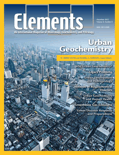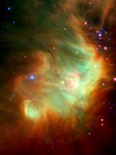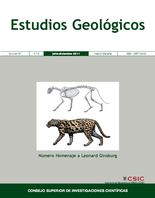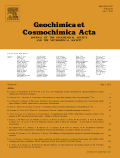
Elements
Scope & Guideline
Unveiling the Mysteries of Our Planet
Introduction
Aims and Scopes
- Geochemistry and Mineralogy Research:
The journal emphasizes the study of geochemical processes and mineralogical phenomena, exploring the interactions between geological materials and their environments. - Planetary and Extraterrestrial Studies:
'Elements' explores not only terrestrial systems but also planetary geology, including the study of exoplanets, asteroids, and other celestial bodies, contributing to our understanding of the universe. - Innovative Methodologies:
The journal showcases advanced analytical techniques and experimental approaches, including molecular dynamics simulations and high-pressure experiments, that enhance our understanding of geological processes. - Environmental and Sustainable Geoscience:
The journal addresses issues related to environmental impact, sustainable resource management, and the role of geosciences in addressing global challenges, such as climate change. - Historical and Contemporary Geoscience:
'Elements' encompasses both the historical contexts of geological developments and contemporary research, thus providing a comprehensive view of the evolution of earth sciences.
Trending and Emerging
- Hydrogen and Deep Earth Studies:
Research on hydrogen's role in deep Earth processes, including its implications for plate tectonics and seismicity, is gaining momentum, highlighting an increasing interest in the geochemical cycles of this element. - Geometallurgy and Resource Management:
Emerging themes in geometallurgy reflect a growing focus on sustainable mining practices and resource management, addressing the need for environmentally conscious approaches in the extraction of minerals. - Extraterrestrial Geochemistry:
The exploration of organic matter in space, including studies on asteroids and the origins of life, is trending as scientists seek to understand the connections between planetary systems and Earth. - Climate Change and Geological Impacts:
Research linking geological processes to climate change, including the effects of large igneous provinces and other geological phenomena on biogeochemical cycles, indicates a rising trend in addressing global environmental challenges. - Advanced Analytical Techniques:
The use of innovative analytical methods, such as high-resolution isotopic analyses and molecular dynamics simulations, is increasingly prevalent, driving forward the frontiers of geochemical research.
Declining or Waning
- Traditional Mineralogy:
There has been a noticeable decrease in the focus on classical mineralogy topics, as the field has increasingly integrated with more interdisciplinary approaches that combine geochemistry and environmental science. - Historical Geology:
Papers strictly centered on historical geological events and processes have decreased, possibly due to a growing emphasis on contemporary applications and environmental issues. - Geochemistry of Fossils:
Research specifically targeting the geochemistry of fossils and paleobiological aspects appears to be less frequent, as the journal shifts towards broader themes that encompass living systems and current environmental concerns. - Conventional Petrology:
Topics focusing solely on conventional petrology have diminished, as the journal embraces a more integrated approach that combines petrology with geodynamics and geochemical processes. - Geoscience Outreach and Education:
While still relevant, the emphasis on outreach and educational aspects of geoscience is waning, indicating a possible shift towards more research-driven content in the journal.
Similar Journals

Annual Review of Earth and Planetary Sciences
Unlocking the Secrets of Our Planetary NeighborsAnnual Review of Earth and Planetary Sciences is a leading scholarly journal published by Annual Reviews, dedicated to advancing our understanding of the dynamic processes governing the Earth and its celestial companions. With ISSN 0084-6597 and E-ISSN 1545-4495, this esteemed journal, established in 1976, has consistently provided comprehensive reviews that synthesize cutting-edge research across various disciplines, including astronomy, astrobiology, geology, and planetary science. Notably, the journal has achieved a remarkable position in the academic landscape, ranking in the Q1 quartile across multiple categories, including Astronomy and Astrophysics and Earth and Planetary Sciences, with Scopus rankings placing it at the forefront of these fields. The journal's commitment to facilitating open access to critical scientific advances, though not fully open, allows for maximum reach within the research community. Researchers, professionals, and students alike can benefit from the high-impact articles designed to foster collaboration and innovation within the fields of earth and planetary science.

Geosfernye Issledovaniya-Geosphere Research
Innovating Insights for a Sustainable PlanetGeosfernye Issledovaniya-Geosphere Research, published by TOMSK STATE UNIVERSITY, is a significant addition to the scholarly discourse within the fields of Earth and Planetary Sciences, Ecology, and Geography. With a focus on innovative research and insights that span a broad spectrum of environmental and geographical studies, this journal aims to provide a platform for researchers and students alike to disseminate their findings and discuss pressing issues facing our planet. Though classified in the Q4 quartile for its 2023 metrics, it serves as an important venue for early-career scientists and scholars from the Russian Federation and beyond to contribute to the global dialogue surrounding geosciences. The journal operates with various access options, making it accessible to a diverse audience. It encourages submissions that inspire robust discussion and exploration of topics vital to our understanding of the geosphere and its intricate dynamics. Covering the pivotal years from 2019 to 2024, Geosfernye Issledovaniya-Geosphere Research is poised to enhance its relevancy and impact within the academic community.

GEOLOGIA CROATICA
Driving Innovation in Geological UnderstandingGEOLOGIA CROATICA is a distinguished open-access journal published by the Croatian Geological Survey, dedicated to advancing the field of Earth and planetary sciences. Since its inception in 1992, this peer-reviewed journal has become an essential resource for researchers, professionals, and students interested in various aspects of geology. With its robust impact factor and a prestigious place in Scopus rankings, ranking 127th out of 321 in Geology and 77th out of 159 in miscellaneous Earth and Planetary Sciences as of 2023, GEOLOGIA CROATICA maintains a strong international presence. It provides a platform for the dissemination of critical research findings, promoting collaboration and knowledge sharing among the global scientific community. By focusing on high-quality manuscripts that cover geological processes, hazards, and resources, this journal is pivotal for anyone looking to contribute to or expand their understanding of geological sciences. The journal's commitment to open access ensures that invaluable research is accessible to all, fostering a more informed and scientifically engaged society.

ESTUDIOS GEOLOGICOS-MADRID
Unlocking the Potential of Geological Research in Madrid.ESTUDIOS GEOLOGICOS-MADRID is a prominent journal in the field of geology, published by the esteemed Consejo Superior de Investigaciones Científicas (CSIC) in Spain. Established in 1976, this Open Access journal has been a vital resource for researchers and professionals since its inception. With an impact factor reflecting its contribution to the Earth and Planetary Sciences community, ESTUDIOS GEOLOGICOS-MADRID currently holds a Q3 category ranking in Geology as of 2023, showcasing its relevance and quality within the discipline. The journal publishes a diverse array of geological studies, ensuring wide-reaching access to significant research findings, thereby promoting collaboration and knowledge sharing. Established as a platform for both foundational research and applied geology, this journal fosters academic growth and contributes to understanding the Earth’s processes. Researchers, professionals, and students are encouraged to explore its extensive archive, which includes publications from 1976 to the present. For more information, visit the journal's editorial office at Editorial CSIC, C/VITRUVIO 8, 28006 MADRID, SPAIN.

GEOCHEMISTRY INTERNATIONAL
Advancing Knowledge in Geochemistry and BeyondGEOCHEMISTRY INTERNATIONAL, an esteemed journal published by MAIK NAUKA/INTERPERIODICA/SPRINGER, serves as a vital platform for researchers in the fields of geochemistry, petrology, and geophysics. With a deep history reaching back to its inception, the journal spans significant converged years from 1977 to 1978 and continues its publication through 2024. Although it currently does not offer Open Access options, its scholarly impact is underscored by an established reputation indicated by its Q3 categorization in both Geochemistry and Petrology and Geophysics for 2023. Researchers can leverage this platform to disseminate groundbreaking findings and engage with contemporary discussions in Earth and planetary sciences, where it ranks at the 39th and 32nd percentiles within its respective categories. The journal is an essential resource for professionals, students, and scholars seeking to deepen their understanding of geochemical processes and evolve scientific discourse within this dynamic field.

INTERNATIONAL JOURNAL OF EARTH SCIENCES
Championing Open Access for Groundbreaking DiscoveriesINTERNATIONAL JOURNAL OF EARTH SCIENCES, published by Springer, is a leading journal in the field of Earth and Planetary Sciences, distinguished by its Q1 quartile ranking in the 2023 category of Earth and Planetary Sciences (miscellaneous). With an ISSN of 1437-3254 and an E-ISSN of 1437-3262, this journal has been a pivotal platform for researchers, academics, and practitioners since its inception in 1996. The journal's focus encompasses a broad range of topics within Earth sciences, making it a vital resource for contributions that enhance our understanding of geological processes, climate change, and planetary dynamics. The impact factor reflects its high standards and the significance of the research it publishes, ranking it in the 74th percentile among its peers as per Scopus. Furthermore, the journal offers Open Access options, facilitating the global dissemination of groundbreaking research. The editorial team is committed to advancing knowledge in Earth sciences, serving as an essential reference for students and professionals looking to engage deeply with this dynamic field.

China Geology
Elevating Geology Research to New HeightsChina Geology, published by KEAI PUBLISHING LTD, is a leading open-access journal that serves as a pivotal platform for disseminating high-quality research across a wide spectrum of Earth sciences. Since its inception in 2018, the journal has rapidly established itself with an impressive Q1 ranking in multiple critical categories, including Geology, Economic Geology, and Oceanography, among others, reflecting its significant contribution to the academic community. Positioned as a top-tier journal in the Earth Planetary Sciences domain, it ranks #22 out of 321 in Geology and exhibits an admirable impact in sub-fields such as Earth-Surface Processes and Geochemistry and Petrology. China Geology is committed to promoting rigorous scientific inquiry and facilitating the open exchange of knowledge in the geosciences, making it an essential resource for researchers, professionals, and students eager to explore innovative developments and fundamental advances in geology. The journal’s accessibility ensures that critical findings reach a broad audience, thereby enhancing collaboration and driving forward scientific discourse in the global community.

Frontiers of Earth Science
Pioneering Research for a Sustainable FutureFrontiers of Earth Science is a prominent academic journal in the field of Earth and Planetary Sciences, published by Springer. With an ISSN of 2095-0195 and an E-ISSN of 2095-0209, this journal serves as a significant platform for researchers and professionals to disseminate their findings from 2007 to 2024. It is recognized for its impactful contributions within the category of Earth and Planetary Sciences, boasting a respected Q2 ranking in 2023. With a Scopus ranking of 64 out of 195, placing it in the 67th percentile, Frontiers of Earth Science continues to drive academic dialogue and innovation. The journal is dedicated to exploring a diverse range of topics, including geology, meteorology, and environmental science, and amplifying the understanding of Earth systems through rigorous research. Located in New York, USA, this journal embraces an Open Access model, ensuring that groundbreaking research is readily available to the global scientific community, thereby enhancing its accessibility and impact.

GEOLOGICA BELGICA
Shaping the Future of Earth Science ScholarshipGEOLOGICA BELGICA is a distinguished open access journal dedicated to advancing the field of Earth and Planetary Sciences, published by Geologica Belgica Luxemburga Scientia & Professionis. With an ISSN of 1374-8505 and E-ISSN of 2034-1954, the journal has been a beacon of knowledge since its establishment in 1998, ensuring the broad accessibility of crucial research findings. Based in Brussels, Belgium, the journal is recognized for its impactful contributions and has achieved a commendable Q2 ranking in the Earth and Planetary Sciences category for 2023. This makes it a vital resource for researchers, professionals, and students alike, encouraging the dissemination of cutting-edge research. Spanning a diverse range of topics within its scope and converging from 2007 to 2024, GEOLOGICA BELGICA remains committed to fostering dialogue and collaboration among earth scientists globally, further enhancing its relevance and influence in this essential field of study.

GEOCHIMICA ET COSMOCHIMICA ACTA
Illuminating the Complexities of Earth’s MaterialsGEOCHIMICA ET COSMOCHIMICA ACTA is a premier journal dedicated to advancing the fields of geochemistry and petrology, published by Pergamon-Elsevier Science Ltd. With its ISSN 0016-7037 and E-ISSN 1872-9533, this esteemed journal has been at the forefront of scientific inquiry since its inception in 1950, with a strong commitment to disseminating high-quality research through 2024. Its reputation is underscored by an impressive impact factor and a ranking of #8 out of 154 in Earth and Planetary Sciences according to Scopus, placing it in the 95th percentile of its category. GEOCHIMICA ET COSMOCHIMICA ACTA serves as a critical resource for researchers, professionals, and students alike, offering insights into the complex interactions of geological and cosmological processes. While the journal is not open access, it remains a vital conduit for innovative research, fostering the scientific community’s understanding of earth materials and their significance.